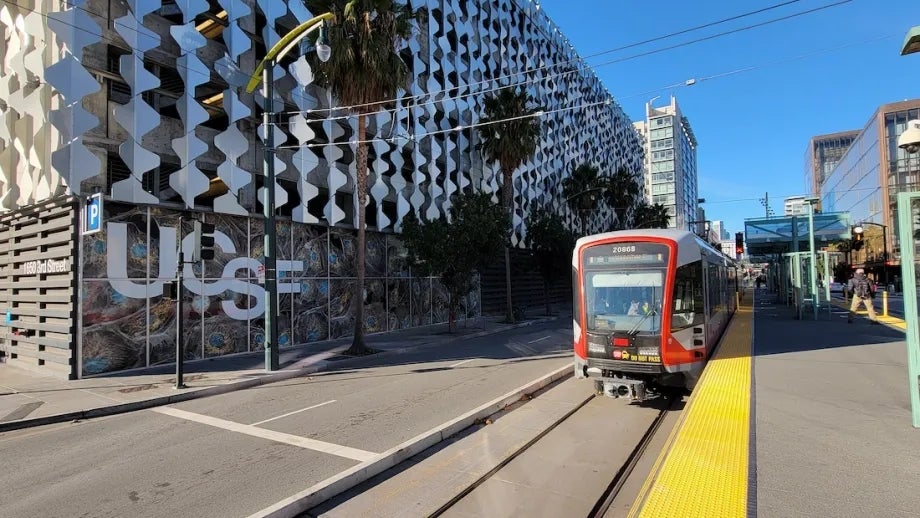Clipper® BayPass Welcomes Aboard UCSF as First Employer to Offer Workers Unlimited Free Transit
The Metropolitan Transportation Commission and the University of California, San Francisco (UCSF) today finalized a partnership agreement through which UCSF will provide up to 6,000 of its employees with passes for unlimited free travel for one year on any of 24 Bay Area transit agencies beginning Jan. 1, 2024. The agreement, approved at the December meeting of MTC's Regional Network Management Committee, makes UCSF the first Bay Area employer to join Phase 2 of the Clipper® BayPass program, which is jointly managed by MTC and BART.
UCSF’s goal is to make public transit more accessible to employees in the university’s lower salary tiers. ”This is an exciting project that has the potential to help our staff with their commutes, keep our transit system sustainable, and contribute to our communities by reducing the number of cars coming to our campuses,” said Erin Gore, senior vice chancellor for finance and administration at UCSF. “We hope this will become a model for other employers across the Bay Area.”
MTC and BART expect to complete similar agreements with other employers in the months ahead. The Clipper BayPass will be made available to as many as 20,000 individuals at up to 10 different companies, institutions or public agencies during the pilot program’s second phase. Employers who wish to participate can get more information and complete an interest form on the Clipper BayPass website at clipperbaypass.com.
MTC teamed with BART and other transit agencies to launch Phase I of the Clipper BayPass pilot in August 2022. The purpose of the program is to study the impact of a single pass that can be used for unlimited access to all Bay Area bus, rail and ferry services, with the exception of San Francisco’s Muni cable cars. Clipper BayPass to date has enrolled some 50,000 people, including residents of several affordable housing complexes managed by MidPen Housing, students at Santa Rosa Junior College and randomly selected students at San Francisco State University, San Jose State University and the University of California’s Berkeley campus.
“One of the big takeaways from the Blue Ribbon Transit Recovery Task Force convened early in the COVID-19 pandemic is the urgency of making Bay Area transit simpler and more seamless,” explained MTC Chair and Napa County Supervisor Alfredo Pedroza. “Clipper BayPass is giving us real-world data on the role fare coordination can play in meeting those goals. We’ll use this information to help shape the development, pricing and implementation of one or more new multi-agency passes or fare caps that eventually will be used by vastly more riders.”
Clipper BayPass partcipants used their passes for more than a combined 2 million transit trips in the first year of the pilot. Usage data indicate these customers take some 40 percent more transit trips than their nonparticipating peers and transfer between systems 74 percent more often.
“In just its first year of existence, Clipper BayPass already is establishing itself as a shining example of regional coordination among Bay Area transit agencies,” said BART general manager Bob Powers. “Clipper BayPass is giving us a vision of the future of Bay Area transit and shows if we make transfers between systems more seamless, ridership will increase across the board.”
Fare coordination and integration is a cornerstone of the Bay Area Transit Transformation Action Plan adopted by MTC in 2021. The Survive & Thrive roadmap released earlier this year by MTC, transit agencies, and business and policy advocacy groups identifies Clipper BayPass as a key strategy for retaining and growing ridership. Transit agencies in 2024 will expand fare integration with the launch of a pilot program for no-cost and reduced-cost transfers between agencies.
Pilot program participants use Clipper BayPass for unlimited travel on:
- BART
- SFMTA (Muni)
- AC Transit
- VTA
- Caltrain
- SamTrans
- Golden Gate Transit
- Golden Gate Ferry
- San Francisco Bay Ferry
- County Connection
- Dumbarton Express
- FAST
- Marin Transit
- Petaluma Transit
- Santa Rosa CityBus
- SMART
- Soltrans
- Sonoma County Transit
- Tri Delta Transit
- Union City Transit
- Vacaville City Coach
- VINE
- WestCAT
- Wheels
Aside from allowing travel at no charge, the Clipper BayPass functions like any other Clipper card. Participants use their Clipper cards — either traditional plastic cards or Clipper cards on their smartphones or Apple Watch — to tag on (or off) at faregates, on buses, on rail platforms or at ferry ramps. The Clipper BayPass may not be shared with family or friends; it may be used only by participants selected for the pilot program.
MTC is the transportation planning, financing and coordinating agency for the nine-county San Francisco Bay Area. The Commission operates the Clipper transit-fare payment system on behalf of the region’s transit agencies. MTC’s YouTube channel features a video with more information about the Clipper BayPass pilot program.

